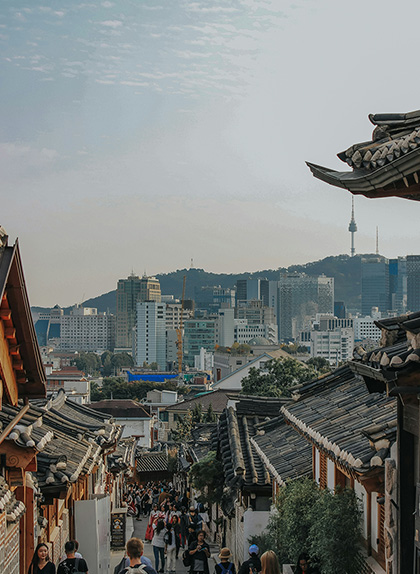Evacuations from High-Risk Locations Call +44 (0)1202 308810 or Contact Us →

Seoul Proposes Talks with Pyongyang and Potential Travel Risks
18 Jul 2017
On 17 July 2017, South Korea authorities proposed landmark talks with its neighbour North Korea. The Defence Ministry of the new government in Seoul has suggested talks between representatives of the two militaries on 21 July at Tongil-gak, the northern side of the ‘truce village’, Panmujon, of the De-Militarised Zone (DMZ). The planned talks are, according to South Korea’s Deputy Defence Minister, aimed at ending “hostile acts” between the two Koreas, which “escalate military tension.” South Korea’s Unification Minister has described the talks as a follow to a speech recently made by President Moon on a trip to Berlin, in which he promised to meet Kim Jong-un “at any time, at any place”.
Key Points
- South Korea has proposed plans to hold discussions with North Korea.
- Seoul has proposed Panmujon, a border village, as the sight for these talks.
- This move falls in line with the more conciliatory approach espoused by new President Moon.
Situational Summary
Political: On 17 July 2017, South Korea authorities proposed landmark talks with its neighbour North Korea. The Defence Ministry of the new government in Seoul has suggested talks between representatives of the two militaries on 21 July at Tongil-gak, the northern side of the ‘truce village’, Panmujon, of the De-Militarised Zone (DMZ). The planned talks are, according to South Korea’s Deputy Defence Minister, aimed at ending “hostile acts” between the two Koreas, which “escalate military tension.” South Korea’s Unification Minister has described the talks as a follow to a speech recently made by President Moon on a trip to Berlin, in which he promised to meet Kim Jong-un “at any time, at any place”.
Solace Global Comment
This is a brave, and some may say, foolish move by President Moon’s new administration in Seoul. Moon has stuck to a campaign pledge to take a more conciliatory approach to Pyongyang than his predecessor, President Park. If these talks go ahead, it will be the first set of military-to-military talks since 2014, and the first high-level talks since 2015. In 2016, under the previous administration, communication hotlines between both sides were cut off after a North Korean nuclear test.
President Moon seemingly appreciates three important issues. Firstly, any military conflict involving the North would be disastrous; Seoul is already within reach of North Korean artillery; therefore, the easing of tensions is vital. Secondly, despite the sanctions placed on Pyongyang, they do not seem to be having a significant impact on the regime’s behaviour. North Korea has become adept at skirting around the sanctions or evading them all together. Thirdly, there is the belief that previous talks did prove beneficial. The “Sunshine Policy”, implemented between 1998-2008, instituted a softer policy towards North Korea. The policy had its critics, but under President Park, most North-South dialogue had been cut off. Moon evidently believes that some dialogue is better than none.
Moon has been smart to not overpromise for these talks, with a goal that is purposely vague. Putting too much emphasis on talks between the two sides threatens Moon’s political capital, especially while he is in his honeymoon stage. Moon’s own prestige will not be significantly impacted if these planned talks turn out to be fruitless. However, at the time of writing, Pyongyang has yet to respond to the overtures of Seoul. If they reject the opportunity to talk, this may prove to be a blow to the pro-dialogue policies of Moon Jae-in, with opponents likely to call for a more assertive policy towards the North.
While this is not clear, this move by Seoul may represent the beginning of a new strategy for the US-Korean alliance, with one side offering a stick, and the other a carrot. The US has sought to build up its military presence in the region, increase cyberattacks to hamper the North’s missile testing, and heighten the sanctions programme in order to ramp up the pressure on Kim’s regime. While Seoul may be beginning a diplomatic charm offensive to dampen tensions in the region. An alternative explanation for this move by his administration is that it could represent the first visible split in the Trump-Moon relationship. If this is the case, it will prove detrimental to US ambitions in the Asia-Pacific, as they seek to control the rise of China and maintain their own influence in the region.
As with any diplomacy, talks between both sides have the potential to not only reduce but to also heighten distrust and tensions further. Due to the nature of these talks, the international community should not be expecting a great deal to come out of them. Instead, if these talks can snowball into other and more extensive or meaningful talks, they will be seen as a success.
SECURITY ADVICE
PoliticalLowAll travellers to the Korea Peninsula, or those planning travel, are advised to pay close attention to changes in the local security environment. Political developments in the region are likely to increase risks of armed conflict or civil unrest. All large public gatherings should be avoided as protests in late 2016 and early 2017 showed, there is the potential for violence. Travellers with long-term deployments in South Korea are advised to put an evacuation plan in place, in case conflict between the North and South emerges. Travellers should also note that compounds in the DMZ are tourist locations. These should be avoided should the talks go ahead and heightened security measures are likely to be in place.
Solace Global would not advised clients of the need to employ enhanced security provisions when visiting South Korea. However, they may wish to use travel-tracking technology with an intelligence feed in order to alert others if in danger and to stay abreast of local security developments.